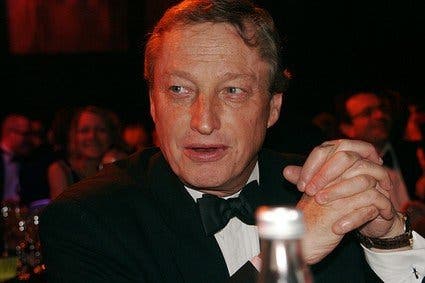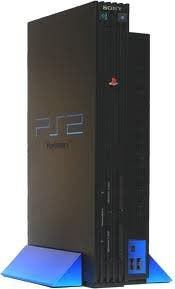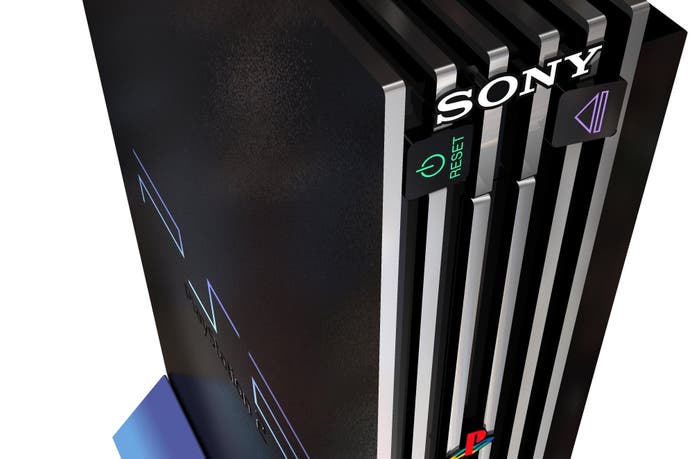PS2: The Insiders' Story
To mark the end of PS2 production, we're re-publishing our insiders' account of the console's success, featuring Chris Deering, Phil Harrison and more.
2nd January 2013: This feature was originally published in November 2010 to mark the PlayStation 2's 10th anniversary in Europe. We're highlighting it again today to mark the news that Sony is ceasing production of the PS2 console.
PS2 is the most successful console ever produced, having sold over 150 million units. Here, someone who was there when it all began talks to other Sony staff, past and present, about what really went on behind the scenes.
The first thing I saw when I walked in the room was a duck wearing a suit. Next to him stood a grubby-looking mummy, trying to hold a glass of champagne in bandaged fingers.
In the corner, a guy in a wheelchair was talking to a girl whose eyes should have looked too far apart. She was sitting on a sofa next to a disembodied arm and a small boy. He looked innocent enough, but I knew he had conquered worlds.
This was my introduction to the games industry. It was Thursday 23rd November 2000, the eve of the European launch of PlayStation 2. Just three days earlier I'd started my new job as a copywriter at Sony Computer Entertainment Europe. Having been a gamer and a PlayStation fan for years, I felt like Charlie being given the keys to the chocolate factory.
In fact I'd been given an invite to the PS2 launch party, hosted by hip London ad agency TBWA. They were responsible for the Third Place advert directed by David Lynch, as they had been for the Double Life and Mental Wealth campaigns.
It was the stars of these adverts I was now walking past as I headed for the bar. I was about to make the most exciting discovery yet in an already thrill-packed week - at games industry parties, all the drinks are free.
You know what happened next. Well, perhaps not the thing about the bottles of Bombay Sapphire and the guy from R&D who tried to put his business card down my bra. But those are other stories. This is the story of how PlayStation 2 went on to become the best-selling console of all time.
The machine still holds that title. According to Sony's latest figures, 147.6 million PS2 units have now been sold around the globe. That's approaching double the amount of Wiis shifted and 40 per cent more units than PS3 and Xbox 360 combined.
PlayStation 2's success was down to a combination of factors, such as well-designed hardware, a price point which quickly became affordable and great games. It was also about the calculated genius and bold business sense of the people behind the scenes, along with a healthy dollop of sheer luck.

Sony's commitment to making PS2 a hit didn't begin with that launch campaign. It was established back in 1995, when Chris Deering left his native US to become the founding president of Sony Computer Entertainment Europe. Speaking today, he recalls taking a long-term view from the beginning.
"From day one on PS1, I started thinking about what I would do to make sure PS2 could win round two," Deering says.
"Nintendo and SEGA had never won two in a row. We used to say it was like winning two gold medals in two back-to-back Olympics - it just never happened. So I set that as a personal goal."
The first part of the mission went according to plan. PlayStation 1 became the first games console to achieve global sales of 100 million. It made gaming cool, as evidenced by the appearance of WipEout in nightclubs and Lara Croft on the cover of The Face, an event still cited by journalists as being about as culturally significant as the invention of books.
So Sony already had a strong fanbase onside, as senior PR manager Jonathan Fargher recalls. "We'd done some really cool things with PS1 and there was a kind of hype and expectation. There was a hell of a lot of good will towards PS2, people wanted it to do well," he says.

"It's hard not to look back then and look at things now. PlayStation as a brand was incredibly cool and cutting edge. People were genuinely excited. There was a level of buzz for the launch that was probably missing from later hardware launches." Cranking the handle on the internal hype machine was Chris Deering. He was the first member of SCEE staff to see the finished PS2 console, at a special event in Tokyo's International Convention Centre.
"I remember sending an email at 2am from Japan to all the employees in London, saying, 'It's better than we ever expected. This is going to be huge. I feel privileged to have even been in the room. This is history in the making.' It was beautiful."
UK managing director Ray Maguire was also impressed, if a bit more British about it. "The first time I saw the PS2 prototype it was just a shell made of wood. It was a complete step-change from PS1. Just the way it was constructed and designed... It was fresh, it was exciting. It looked more meaty and powerful."
However, impressive hardware isn't enough to win a console war, as Sony was aware. "A platform is only ever going to be successful as the games we produce for it," says Fargher.
Though no one would ever have said so at the time, not everyone in the company was confident all the games launching alongside the PS2 were blockbuster titles. That included David Reeves, then head of marketing and later Deering's successor as SCEE president.
"The line-up... I have to say we had a few dogs in there, like Fantavision," he says.
Fargher wasn't keen on Sony's first-party firework sim, either. "Some of the launch titles were OK, but they weren't... I mean, Fantavision... Three weeks after bonfire night and we were launching a game about fireworks.
"We got away with a hell of a lot," he admits. "At E3 we'd promised the world, basically. We'd promised games that would look like Toy Story. The games we delivered at launch, as with any platform... Not so much."









